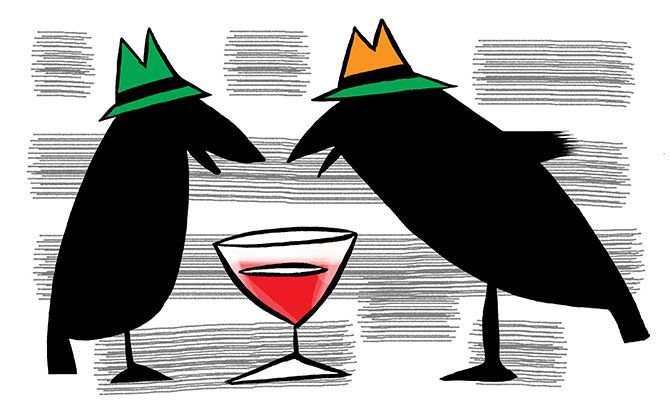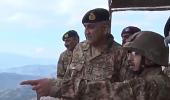'One of R&AW's greatest achievements is in projecting itself as benign.'
'This work -- done in tandem with the Diaspora and the MEA -- sells a story of India as mostly the victim.'

None of Adrian Levy and Cathy Scott-Clark's previous best-sellers on India and Pakistan -- Deception: Pakistan, the United States, and the Global Nuclear Weapons Conspiracy; The Meadow: Terrorism, Kidnapping and Conspiracy in Paradise; The Siege: The Attack on the Taj and The Exile: The Stunning Inside Story of Osama Bin Laden and Al Qaeda in Flight -- kicked up the kind of controversy which their latest book Spy Stories (Juggernaut) likely will.
Levy and Scott-Clarke reveal the cloak-and-dagger, hall of mirrors world that is spying in India and Pakistan, involving India's external intelligence agency, the Research and Analysis Wing -- RA&W -- and Pakistan's directorate of Inter Services Intelligence, the ISI.
In an e-mail conversation, Adrian Levy tells Rediff.com, "R&AW also strikes, secretly, with reciprocal hot actions in Iran, Baluchistan, Sindh, Punjab, Kashmir and FATA."
The second of a multi-part interview:
What kind of working culture does R&AW have?
R&AW has had to contend with the national psyche. India, profoundly non-aligned, but also pacifist for many years, never really got behind the idea of R&AW.
It was frequently poorly funded, and not backed by governments, which cut it adrift.
It also fought with itself, one set of officers preferring trust to operational security, protesting new, draconian protocols, while some senior executive officers reigned like maharajas winning the contempt of their subordinates.
But despite this, it forged a core of officers, who were determined but also often outstanding.
These officers flourished and inspired others who followed.
And through this process of being loved and unloved, of being led but never allowed to lead, of failing to be chartered or provided with a constitutional shelter, R&AW did calcify.
It could not escape its police roots and its rigid promotional structures -- however well its hard-working officers performed.
This left it out of the running -- globally, or marginalised in terms of languages, analyses, and tech, especially Artificial Intelligence etc. But despite all of this R&AW won some of the time.
R&AW won most often in the narrative control game. It uses its influence well abroad. It works with the Diaspora to reap the rewards of its connects to global finance, tech, and political science.
R&AW also wins diplomatically, often -- working with the MEA and others.
It won over China to defeat Jaish and Masood Azhar.
It wins over Pakistan -- in the perception wars -- almost every year, apart from at Balakot and what came after, as Pakistan claimed that prize.
R&AW also strikes, secretly, with reciprocal hot actions in Iran, Baluchistan, Sindh, Punjab, Kashmir and FATA. Sometimes it wins or makes inroads here too, from the little we see.
But whereas foreign intelligence elsewhere is looking to become like the societies around it, recruiting widely from them, R&AW is not or cannot be a mirror to India.
It has become ideological with a recruiting pool that has not responded to faith, caste, class and linguistic challenges.
It looks more like a version of 1980s India than the new Millennium.
And I believe it is being kept like this, as are the police, so that they can be controlled for political dogfights.
By the way -- this story is one that transcends governments -- and so it would be wrong to characterise this as simply a BJP innovation post 2014.
Governments of all colors in previous years have had the chance to make dramatic changes but have bottled it or ignored the problems.
The spy agencies in India are forced to keep quiet -- but their leaders are quiet too, unable to make a case for transformational change.
And Pegasus won't help their case. Politicians will use Pegasus as an example of the need to reign in intelligence agencies.
But Pegasus is also an argument for transforming them to bring them into the precincts of democracy, give them oversight, empower them with legal foundations, enabling their ability to innovate, while ensuring why and who they target meets with national strategic needs rather than narrow sectarian ones.
Finally, one of R&AW's greatest achievements is in projecting itself as benign. This work -- done in tandem with the Diaspora and the MEA -- sells a story of India as mostly the victim.
While India has been a real victim of terror and insurgency, much of which was fueled by Pakistan, this is not the whole story.
India is the protagonist too -- or if you prefer, India is also 'the one who knocks', to steal a scene from Breaking Bad.
India does many things that will never be willingly told, and insights into some of these are told for the first time in the book.

You have written about many stories related to J&K. How do you see the invisible battles of the Indian and Pakistan intelligence agencies in J&K?
J&K is one theatre in which continual combat has been fought -- just one.
And it is the most lethal. So much has happened and most of it cannot be explained even now.
There are so many false fronts and disguises, so many proxies, false flags, misattributions, and mirages -- on both sides -- wrapped around the ideological contest between India and Pakistan that Kashmir has become the desultory product of the spy wars where cruelty is the norm.
Pakistan has made it so, one could argue. But this would only be partly right.
R&AW-IB (the Intelligence Bureau) are not passive actors in this trauma. Nor is the Indian State.
But reporting restrictions and self-censorship have prevented some Indian news outlets from telling this story well, just as British reporters, facing censure and prosecution, failed to articulate the Northern Ireland war well for decades.
But in Kashmir, the consequences are distressing.
Civilians are crushed, the judicial system (in all of its forms) is held in abeyance, laws are still in place that stymie The Law -- like AFSPA and the PSA.
Courts are frustrated, the digital world is suspended more often than most other places.
Narratives are created -- so much so that many stories from Kashmir are literally un-believable and might take a lifetime to unpick.
In Kashmir, a contested state, where the will of a section of the people is being overwritten by the desires of the State, continual collective punishment is rehearsed, critics of it jailed, silenced, or vanished in ways that echo the crises in Gaza and Mexico.
Until the 9/11 wars, Pakistan was undoubtedly a key protagonist, arming, funding and directing the home grown movements who were bolstered with battle hardened fighters from the Afghan imbroglio.
But then the legacy outfits from Kashmir -- Jaish and Lashkar -- escaped their masters and inflamed Kashmir, but also raked Pakistan, in a terrible instance of blowback.
Now these outfits have melded with elements from al-Qaeda, and Islamic State and the Pakistan Taliban, and skipped to lawless staging areas in Afghanistan, to present a renewed threat, to India, Pakistan and Afghanistan but also wider afield.
But this is not just a story of an evergreen enemy.
It is the story of how India lost its way in Kashmir and how history has caught up with Pakistan.

Peace was offered in a Musharraf backchannel that came closer to success than anyone knew at the time.
Then, by 2007, when the numbers of firefights and bomb blasts in Kashmir was dwindling, when terror was being throttled, and war was pending in FATA and NWFP, the chance for peace was undone by insurgent outfits determined to bring Pakistan and India to war so as to preserve the lawless spaces in which they multiply.
26/11 served this interest -- to incite a regional conflagration.
It was serviced by the breakaways from the intel services, the military and special forces, led by Lashkar under the tutelage of al-Qaeda.
However, having shown remarkable patience post 26/11, the calculus inside Indian security agencies post 26/11 seems to have been to take the fight to Pakistan, as well as Jaish and Lashkar etc.
And by 2010/2011, the conditions were created by security agencies to commence a different kind of combat with the will of the Indian people.
The security services deployed in Kashmir while enjoying the climate of total impunity, a desire to remain unaccountable, created another waves of dismay and anger -- mass rallies and riots protesting random civilian killings by the military that could have been avoided.
These protests at the failure of accountability, were countered with ever greater violence, that maimed and scarred a new generation -- blinding thousands of them -- jailing others, setting fire to the Valley once more.
The new uprisings post 2014 could be seen glowing and then igniting in slow motion.
This was a war ushered in rather than a conflict that caught the establishment unawares like in 1989.
Finally, those who had been forged in the new uprisings -- the Burhan Wani batch -- were dismembered one by one, in overlapping, staged operations, that denuded morale, before the BJP could finally, also abrogate the State's special arrangements having 'demonstrated' that Kashmir was now lawless -- and having made it so.
The BJP stated publicly it wanted it this way -- in its manifesto. The security agencies made it so.

Kashmir does also represent success for these agencies, prior to the 2014 debacle.
In working with politicians and diplomats to throttle the insurgency, the spy agencies found new allies, abroad, especially among Muslim states.
R&AW-IB also penetrated Jaish and Lashkar in ways that have never been described before. This took smart analyses, and brave field operations.
They created halls of mirrors in which insurgent cells could no longer rely on what they were seeing and hearing.
They drove these cells into oblivion, enabling them to mount appalling operations that saw their space in society eviscerated.
But in so doing -- in their white-hot brilliance -- the R&AW-IB combine, with its work horses in the police Special Task Force or Special Operations Group (which in itself became like the French Foreign Legion, recruiting the kinds of cops who faced censure or prosecution elsewhere), a state that was destroyed was declared conquered.
Total war reaped total victory, but over what?

For every Masood Azhar, the plump cleric behind Jaish, there was a Kuka Paray, the wedding singer and cut-throat, who became India's insurgent.
Azhar's cohorts pressed the total war button every time peace reared its head.
Paray did it locally. Jaish could not be contained and the Indian government proxies likewise, would only be slowed down by death.
In telling some of these spy stories from Kashmir, from Pakistan and India's perspectives, we have challenged officers to describe their goals, and articulate their endgame.
- Part III: The Importance of Ajit Doval
Feature Presentation: Aslam Hunani/Rediff.com











 © 2025
© 2025